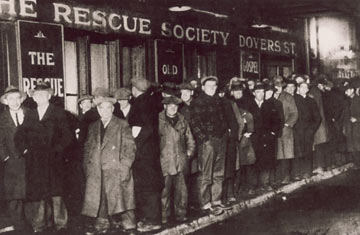
A bread line forms outside the Rescue Society on Doyers Street in New York City during the Great Depression
(2 of 2)
Are you just talking about financial institutions or companies in general, such as GM?
It applies to any kind of firm that isn't solvent. It doesn't matter if it's a car producer, an industrial firm or a financial firm. It should be encouraged or even compelled to file for bankruptcy. When you keep on bailing out institutions indiscriminately, there is no incentive for them to be prudent in what they're doing, because they know that whatever they do, whatever problems they create by their own behavior, the government will come along and bail them out. So you are providing incentives for institutions to operate in a way that will only increase the opportunities for firms to behave in an unacceptable manner. The government's [bailout] actions will make the economy less productive and less prudent.
So you think the auto industry should not have been bailed out?
If GM was on the verge of bankruptcy, it should have been shut down. There's all this capacity in the production of cars, but there isn't a market that can absorb all that these firms are prepared to produce. If jobs are lost, then jobs are lost because these are firms that cannot exist, because there is insufficient market demand for their product. And if there is no such market demand, they should not be allowed to exist. Let the market decide if these firms deserve to exist. Government should not be the one who's the arbiter.
There's much debate over proposed health-care reforms. Is Obama on the right track?
The trouble with Obama's plan is that he has no concept of the cost that he will be imposing on the economy if his program is actually enacted. He's spending money with the stimulus program — all kinds of programs — and he's always able to give excuses on why the money should be spent. Yet despite all of his rhetoric, Obama isn't really taking care of the budget ... I don't think the government's job is to provide health care — the private sector is the proper provider. He has no concept of what he is demanding of the private sector [or] of how much it will cost in the way of limitations on the health care that will be available because of the government's intervention.
When you say limitations, do you mean the quality of health care won't be as good?
The quality, the incentive to provide innovations in health care, will all be in danger by the government's intervention. A lot of people in Canada cannot get ordinary [surgical] procedures because there's a limit on what the government provision of health care allows. So people are lined up for years to get ordinary procedures that in America are just routine. You can get a hip replacement [here] without waiting for years, and you don't have to be a celebrity on a list to get immediate health care.
What about the battered housing sector? Has Obama done enough to help this sector?
It was the government's program to promote homeownership that permitted all of the excesses that occurred over the years. People who should never have had a mortgage were induced to buy a home when they couldn't pay for it. And as a result, those are the ones whose homes are being foreclosed, and the whole economy is affected.
Should more steps be taken to stop the foreclosures? Or would it be better for the foreclosures to proceed?
One of the things that can be done to make the housing market more stable is if something is done to limit the foreclosures. There's been a lot of rhetoric about helping mortgage holders who cannot maintain their monthly payments on the mortgage, but very little, in fact, has been done to help them. If they've really got a program now that will work, that will help to stabilize the housing industry, and that will improve chances for a revival of the economy.
